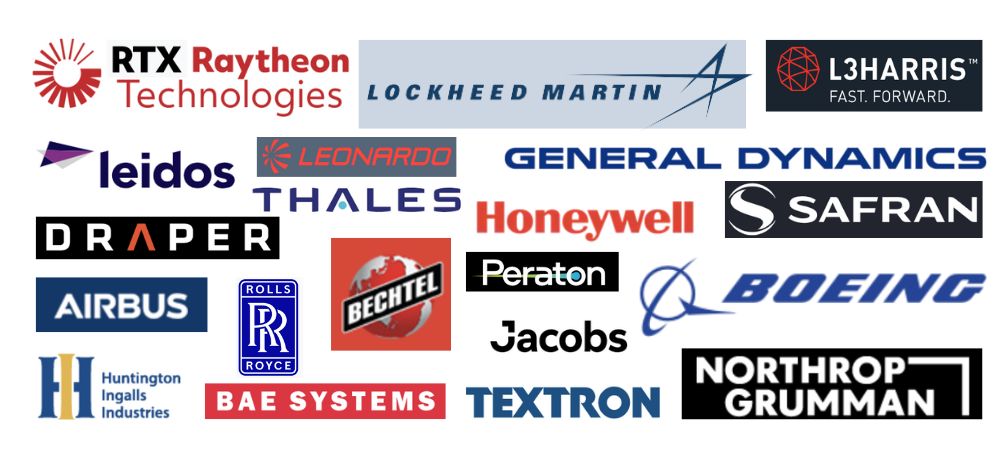Get your bank, your school, your faith community, your town, local hospital or other community institution to divest! Getting an institution to divest is not something that will be achieved in one day, but will take time and perseverance…
As an individual, you may have money that is directly supporting the nuclear weapons industry through a bank, credit card, insurance company or pension fund. You can learn more to make sure you are not unknowingly involved in the nuclear weapons in the Financial Institutions tab below.
Even if you individually do not have investments in the nuclear weapons industry, your town, school, faith community, hospital, or local businesses may. If you have connections to any of these institutions, you can urge them to divest from the nuclear weapons industry. Use the tools below to learn more about what you can do and how to talk to these institutions about divestment.
These are the top nuclear weapons companies.

And better yet: Join the global movement for “Fossil and Fissile” divestment, and push for divestment from both fossil fuels AND nuclear weapons!
Divestment Actions:
Getting your target institution to divest is not something that will be achieved in one day, but you can launch your campaign (or join an existing one) with a day of action to rally support for divestment and/or other steps they might take to dissociate from the nuclear weapons and/or fossil fuel industries.
Check out these simple actions you can take to get you started! And read on in the tabs below for more specific information about divestment at various institutions.
Handing a Letter to your Institution
Hand a letter to an institution you are involved with calling on them to publicly divest from nuclear weapons. Take pictures. Send a press release to your local newspaper. Find a local dignitary or well-known personality to hand in the letter. Warn the target institution (or not) that you are coming and arrange for them to accept the letter. Include in the letter a request for a meeting to discuss divestment. Bring a crowd!
Set up a meeting with your institution
Another option is to send a letter ahead of time or otherwise ask for meeting to discuss divestment take place during the Weeks of Action. Prepare some materials to distribute to the press as well as to the institution explaining the reasons for divestment. Take pictures, send a press release, bring a crowd to support outside the meeting as it takes place…
Rally for Divestment
Especially if you have already approached an institution about divestment, or if there is an existing campaign you can work with, you might consider stepping up your divestment actions with a rally or a sit in.
Again, remember to take pictures, let the media know, and use the hashtag #PressuretheProfiteers!
Change your Bank
If your bank refuses to divest from nuclear weapons, you can make the choice to move your money!
Make sure you tell your bank why you are leaving them!
See Don’t Bank on the Bomb’s Hall of fame for financial institutions with Nuclear Weapons investment policies here: https://www.dontbankonthebomb.com/policy-analysis-report-moving-away-from-mass-destruction/
Learn about transferring your funds to sustainable investment groups here: https://weaponfreefunds.org/action-toolkit

Financial Institutions are heavily invested in the Nuclear Weapons Industry, and the Fossil Fuel Industry.
Some of the worst offenders in both industries are:
- BlackRock
- Vanguard
- JP Morgan Chase
- Morgan Stanley
- Bank of America
- WellsFargo
- CitiGroup
What are we asking Financial institutions to do?
Develop a comprehensive policy against investing in nuclear weapon producers
Financial institutions should develop policies that exclude all financial links with companies involved in the production of nuclear weapons. Investment makes production possible. This means that no exceptions will be made for financial services on behalf of third parties, for funds that follow an index, for project finance for civil purpose of a company that is also involved in nuclear weapons, nor should it be a policy that only excludes project financing for nuclear weapons.
Inform the producer why they are divesting
Financial institutions should inform the producing company about the decision to end investments because of the company’s involvement with nuclear weapons. The financial institution can set clear deadlines within a limited time frame for the company to stop its activities related to the production of nuclear weapons, in order to reverse its decision to divest. In cases where a producing company continues it’s involvement in the production of nuclear weapons after the set deadline, the financial institution will have to divest until the producing company stops its involvement. New requests for investments will have to be declined therefore until the company has stopped all activities related to the production of nuclear weapons.
Apply the divestment policy to all activities
Financial institutions should apply their divestment policy to all their activities: commercial banking, investment banking and asset management. All of these activities actively assist a company in the production of nuclear weapons. In case this requires a policy change for investment funds, investors should have a deadline to sell their participation in these funds after notification of this policy change.
5 Reasons financial institutions should divest from nuclear weapons producers
1. Nuclear weapons are inhumane. Financial institutions can have their own opinion, and do have their own opinion when it comes to what is allowable for them, and their clients to invest in. Financial institutions can decide not to invest in products that are inhumane by design.
2. There is a stigma attached to financing the bomb. No one wants to be known as a nuclear weapons investor, just as financial institutions don’t want to be known as investing in prostitution. There are some reputational risks that investors need to consider.
3. Consumers are going green. Around the world consumers are seeking ways to eco-label their activities, whether by purchasing fair trade products or shifting their investments towards socially responsible funds.
4. Nuclear weapons producers are financially neutral. For the most part, the return on investment from nuclear weapons producers is not significantly more or less than other industries and markets. There is no significant financial benefit, or loss, from divesting from these producers.
5. There exists a binding obligation to negotiate disarmament and eliminate arsenals. This obligation means that nuclear weapons production is not a viable long term industry. In addition, as of 22 January 2021, nuclear weapons are comprehensively prohibited under international law, as is any inducement or encouragement to continue manufacturing them.
Examples of US Financial Institutions that have divested and implemented policy that comprehensively prevents any financial involvement in nuclear weapon producing companies:
- Domini
- Harrington Investments, Inc
- Green Century
- Zevin Asset Management
- Learn more at Don’t Bank on the Bomb
What You Can Do:
You can check on the status of your financial institution’s investments in Nuclear Weapons at Don’t Bank on the Bomb or Weapons Free Funds
Follow this handy guide on Personal Divestment to make sure your money is not associated with the producers of Nuclear Weapons:
1. Talk to your financial institution
Tips and tricks from ICAN
If your bank, insurer or pension-fund is identified as an investor in nuclear weapon producer companies, you can help increase the pressure on them to drop their investments in nuclear weapons by calling or sending a message through their website.
Your message should let them know that you, as a client or shareholder, are watching and expect them to drop investments in companies building prohibited weapons of mass destruction.
Tips for Calling
Here are some tips on what you might say:
- Start by letting them know who you are, so that they know they are accountable to you: Do you hold a bank account with them? Are you a member of their pension or investment plan? Do you own shares in their company?
- Then, let them know you are aware of their investments in nuclear weapons companies, and ask them uncomfortable questions about it.
For example:
- “I just learned through PAX’s Don’t Bank on the Bomb report that NAMEOFYOURBANK is investing in nuclear weapons producing companies. This is unacceptable to me as nuclear weapons are indiscriminate weapons, prohibited under international law.
- Could you tell me more about how NAMEOFYOURBANK, as a responsible actor, justifies this investment?”
Chances are that they will try to wave you off by talking about their general policies on being responsible with their investments and how they have to make the money long-term, but always bring it back to nuclear weapons. Here are two things you can say:
- “I understand, but what I would like to know is if you have a policy on investing in weapons prohibited under international law? Surely it’s not acceptable by policy to profit off weapons designed to mass murder millions of civilians”
- “I understand, but how is investing in weapons of mass destruction a safe investment product? Surely that’s a major financial and reputational risk?”
Finally close it off by telling them what you expect: change and a written response.
- “ I would really like to hear back from you about the policies you have, or when you expect to adopt them. I am very disappointed that NAMEOFYOURBANK has these investments, and as a client, I would like to make sure none of my savings or investments are connected to the nuclear weapons industry.”
And remember, being confident in what you have to say, but always remaining friendly and calm will take your message a long way!
Online Messages/ Letters
Some financial institutions don’t want to take your call, but do have a comment form for clients to send a message. You can also send letters or emails to your bank. Feel free to modify this as you like and send it in.
Hi,
I’m a client and I’m concerned that you may be using the money I have here to support companies involved in the nuclear weapons industry. There are a couple dozen companies involved overall, and as a client, I would sincerely appreciate it if you could make sure they are excluded from any investments made by this institution.
Nuclear weapons are prohibited under UN Treaty, and if they were ever to be used again they would cause catastrophic damage to people and the environment.
In the last couple of years, the threat of nuclear weapons use has been increasing. When you invest in the companies involved in the nuclear weapons industry, you’re using my money to contribute to a global problem that is extremely preventable.
Please send me a copy of your controversial weapons policy without delay, and let me know how I can make sure that I’m not exposed in any way to an industry designed to destroy.
Thanks for your time,
If the institution does not respond be sure to keep pushing! Resend your messages, follow up with phone calls. You can escalate your campaign to add pressure by getting local journalists involved, publishing Op-Eds and organizing standouts and other actions at the company locations.
2. What Next?
If you are able to dialogue with your financial institution, you can ask them to join the Nuclear Weapons Free Finance Initiative. Learn more here: https://divest.icanw.org/nw_free_finance
If your bank, insurer, or fund holder refuses to stop their financial involvement with the Nuclear Weapons Industry after you’ve followed the above steps, you can make the decision to move your money to a Nuclear Weapons Free Institution. Be sure to let your old profiteers know why you are leaving them!
Learn about transferring your funds to sustainable investment groups here: https://weaponfreefunds.org/action-toolkit
Getting your college or university to divest

Many colleges and universities have investments that support the companies that make nuclear weapons. Many have contracts for products or services made by these companies. And some are undertaking research that supports the continued existence of nuclear weapons
Boycotting, divesting and prohibiting these activities can affect those companies directly, and it can also be a strong encouragement to other institutions to do the same. The bigger the institution, and the more money they have, the more powerful the impact can be on the nuclear weapons companies.
One way to get colleges and universities to divest from nuclear weapons is to join forces with existing campaigns to divest from fossil fuels, gun manufacturers, weapons for Israel and/or private prisons. One reason that many institutions hold off on a divestment decision is that they are worried more divestment requests are just around the corner. A joint campaign to divest from the twin existential threats to humanity at one and the same time might have more appeal in those cases. And many of the nuclear weapons companies (for instance Lockheed Martin, Boeing, RTX Raytheon, General Dynamics. BAE, L3 Harris, Northrup Grumman, Textron) also make weapons used against civilians in Gaza and/or in other wars, so there are clearly opportunities for collaboration when focusing on those companies.
Step 1: Doing Your Homework
Who is empowered to get your college or university to divest and what information will they need to make this decision? A college President may take the lead on this in some cases. In others, it may be the trustees, regents or another type of governing board who need to be persuaded. Who are your allies in this effort? It may be that you already have strong support for divestment among the decision-makers or that you at least have one or two key people on your side. You will need to find out.
What investments does the college or university have? This may be difficult to find out, but Annual Reports and other public sources will likely list the size of an endowment or other assets held by the institution, and major institutional/corporate donors may also be listed. What policies are already in place to manage investments? Is there an ethical investment or ESG (Environment, social and governance criteria) policy? Have there been any successful or unsuccessful divestment campaigns in the past and can you learn anything from those?
Who is most likely to be opposed to this? What arguments or reasons will they likely put forward to stop it? You need to know who and what you are up against as well as who and what you have on your side before you launch your campaign.
Step 2: Building Your Campaign
Once you have identified who are your likely allies, as well as your likely opponents, you need to mobilize your allies and build a campaign. This most likely involves your friends and fellow students, but if you can recruit faculty, staff, or alumni of the college or university, that can be a big boost to your campaign.
Spread the word via word of mouth, text, email, posters on bulletin boards. Set up a meeting to discuss the goals and strategies for the campaign. Build your strength as a movement before confronting the Administration.
Step 3: Engaging Your College/University
In many cases, divestment will require a significant movement among both students and faculty to make this an issue on campus. But sometimes all it takes is talking to the right person with the right information. When this does not at first succeed, don’t give up! Above all, it takes persistence to get an institution to divest. It might take months or even years to succeed!
Hold public meetings, pass out leaflets, hold marches and demonstrations. Depending on the response, it may take more drastic action to get a result. Occupying an Administration building, setting up camp and other forms of direct action need to be thought through very carefully. Students can risk their continued studies, their career choices and even potential jail time, so don’t assume this is for everyone. But commitment and persistence will almost always result in success in the long run. This is about the future of the planet!
Step 4: Taking it to the Next Level
Ideally, a college or university:
- Has no investments in any of the companies that make nuclear weapons.
- Does not purchase products or services from any of these companies.
- Prohibits all nuclear weapons-related research and other nuclear weapons-related activities, so far as they are able, within their jurisdiction or control.
One option for colleges and universities is to officially approve, publish and enforce a policy statement that clearly commits the college/university to adhering, as far as it is able, to the goals and provisions of the Nuclear Ban Treaty, which bans everything to do with nuclear weapons, including assistance with the companies involved in the development, manufacture or maintenance of nuclear weapons. This would be made public and continue to be monitored by a committee of some kind.
How your faith community can divest

Many faith communities have investments, and some of these may be financially supporting the companies that make nuclear weapons. Many faith communities have products or services made by these companies.
Boycotting, divesting and prohibiting these activities can affect those companies directly, and it can also be a strong encouragement to other faith communities to do the same. The bigger the institution, and the more money they have, the more powerful the impact can be on the nuclear weapons companies.
Step 1: Engage with your faith community
Who is empowered to get your faith community to divest and what information will they need to make this decision? Who are your allies in this effort? It may be that you already have strong support for divestment among the decision-makers or that you at least have one or two key people on your side. You will need to find out.
What information will they need to make this decision? Some faith communities may want a presentation or workshop to take in all the facts and concerns relating to nuclear weapons and the companies that make them. Others may be happy to make a commitment right away.
Step 2: Do your research
What investments does your faith community have? What policies are already in place to manage investments? Is there an ethical investment or ESG (Environment, social and governance criteria) policy?
Your faith community will probably start by creating a committee, including those responsible for finance and property, to determine what, if anything, must be done.
If your faith community has investments, you may need to go over these with a financial advisor to see if any mutual funds or other investments are directly financing any of the companies that make nuclear weapons for the US. Even if they don’t have investments with the Nuclear Weapons industry, they may own commercial property or services made by the nuclear weapons companies that you may want to be aware of.
Step 3: Make changes and spread the word
Once you know what involvements the faith community has in the nuclear weapons industry, you can work with your faith community to move their assets to sustainable financial models. You can update or institute ethical investment guidelines for the future.
Implementing this might look like changing banks, if your faith community banks with a financier of the nuclear weapons companies. It is important that you communicate this action and your reasoning to the bank. Before moving your investments you may ask your financial institutions to change their policy and stop investing in nuclear weapons.
Your faith community may also, for instance, have thermostats or other products made by Honeywell. While it would be wasteful and we would not ask you to get a new thermostat, you might write to Honeywell to inform them that you will not buy their products in the future unless they remove themselves from the illegal and immoral nuclear weapons business.
Once your faith community has taken the steps needed to move their money and investments out of the nuclear weapons industry, it is important make that public, informing the world through newsletters, local newspapers, social media, mass media, public announcements, etc.
Sharing this news with other congregations in your area and up through the leadership of your faith community can encourage others in your denomination and different denominations to take action as well.
Example of faith community divestment:
Guide to Quaker Alignment with the Nuclear Ban Treaty
How your hospital or clinic can be part of the solution

Many of the companies that manufacture nuclear weapons also have departments dedicated to healthcare.
For example, Honeywell boasts that 70% of the top 25 medical equipment manufacturers rely on Honeywell tech, and over 300 hospitals use their building technology and integration systems
Do you know if your hospital is one of those 300?
Alongside financial investments, many hospitals and clinics buy medical devices, IT services, and other products made by the same companies engineering unthinkable weapons of mass destruction.
Most of the medical community is on the same page about nuclear weapons, there is an opportunity here to take strong action against these corporations.
Boycotting and divesting affects those companies directly, and it can also be a strong encouragement to local businesses, organizations, cities and states to do the same.
Step 1: Do your homework
Who is empowered to get your hospital or medical institution to divest and what information will they need to make this decision? Likely you will need to reach the board of directors. Who are your allies in this effort? It may be that you already have strong support for divestment among the decision-makers or that you at least have one or two key people on your side. You will need to find out.
What investments does the hospital have, and where does it source its equipment and technology? This may be difficult to find out, but Annual Reports and other public sources will likely list the size of any funds or other assets held by the institution, and major institutional/corporate donors may also be listed.
What policies are already in place to manage investments? Is there an ethical investment or ESG (Environment, social and governance criteria) policy? Have there been any successful or unsuccessful divestment campaigns in the past and can you learn anything from those?
Who is most likely to be opposed to this? What arguments or reasons will they likely put forward to stop it? You need to know who and what you are up against as well as who and what you have on your side before you launch your campaign.
Step 2: Build your campaign
Once you have identified who are your likely allies, as well as your likely opponents, you need to mobilize your allies and build a campaign. Recruit hospital staff, community members, medical professionals. Union representatives can be particularly helpful and influential in navigating the infrastructure.
In many cases, divestment will require a significant movement among doctors and other senior staff to make this an issue for the administration. But sometimes all it takes is talking to the right person with the right information. When this does not at first succeed, don’t give up! Above all, it takes persistence to get an institution to divest. It might take months or even years to succeed!
Navigating boycotting and divestment in the healthcare industry may be particularly tricky due to the integration of the products and services provided by the nuclear weapons companies. You will need to clearly organize around your goals and their importance.
Step 3: Engaging Your hospital/ institution
What information will they need to make this decision? Some hospitals or clinics may want a presentation or workshop to take in all the facts and concerns relating to the nuclear weapons, and the companies that make them. Your hospital or clinic will probably start by assigning a committee, including those responsible for finance and purchasing, to determine how this relates to their current investment policies, if the policies need to be changed, and what if anything, can and must be done in order to stop involvement with the nuclear weapons industry.
If your hospital takes steps to divest from the nuclear weapons industry, that’s a great success. But it is still likely that they are using products manufactured by those companies. Engage with your institution on boycotting these products and services in the future, and pursuing alternatives from more sustainable businesses.
It’s essential to inform them that you will not buy their products in the future unless they remove themselves from the illegal and immoral nuclear weapons business.
And it’s important to make your actions public by posting and informing the world through newsletters, local newspapers, social media, mass media, public announcements, etc.
Talk to your local businesses about divestment and boycotting
Whether you own a local business or you are a patron and community member, you can engage a dialogue for divestment and boycotting.
Your local businesses may have investments or financial holdings with the companies that make nuclear weapons or the banks that support them. Many local businesses could have products or services made by these companies. Along with nuclear weapons, many of these companies provide business solutions for retail, e-commerce, IT, and manufacturing.
Boycotting, divesting and prohibiting these activities can affect those companies directly, and it can also be a strong encouragement to other businesses to do the same. The bigger the institution, and the more money they have, the more powerful the impact can be on the nuclear weapons companies.
Step 1: Engage with your community
Many small business owners may not know if they are financially involved in the nuclear weapons industry, and they may not know that nuclear weapons companies provide services in their industry as well.
Talk to local business owners about nuclear weapons, and ask them to look into any involvement they may have. Ask them about what policies they have in place to manage investments? Is there an ethical investment or ESG (Environment, social and governance criteria) policy? Be persistent and informative.
You may ask your local businesses to speak with their financial advisor to see if any mutual funds or other investments are directly financing any of the companies that make nuclear weapons for the US.
Step 2: Make changes and spread the word
Once a business knows what involvement they have in the nuclear weapons industry, they can move their assets to sustainable financial models. If necessary, you can push for them to update or institute ethical investment guidelines for the future.
Implementing this might look like changing banks, if your business banks with a financier of the nuclear weapons companies. It is important that you communicate this action and your reasoning to the bank. Before moving your investments you may ask your financial institutions to change their policy and stop investing in nuclear weapons.
Your business may also, for instance, use e-commerce or IT services from one of the Nuclear Weapons Companies. Help them use this opportunity to write to the companies to inform them that they will not buy their products in the future unless they remove themselves from the illegal and immoral nuclear weapons business.
Once the business has taken the steps needed to move their money and investments out of the nuclear weapons industry, it is important make that public, informing the world through newsletters, local newspapers, social media, mass media, public announcements, etc.
While sharing the news is important to encourage other businesses to follow suit, it can be an added bonus for the businesses in an opportunity to get publicity and support by taking such an important stand against nuclear weapons.
GET YOUR TOWN OR CITY TO END NUCLEAR CONNECTIONS
Many towns and cities have investments that support the companies that make nuclear weapons. Many have contracts for products or services made by these companies. And some have these companies researching, developing, building or transporting nuclear weapons through their jurisdiction.
Boycotting, divesting and prohibiting these activities can affect those companies directly, and can also be a strong encouragement to other cities – and states – to do the same.
Talk to your City Councillors, Mayor or other local officials to see what your town can do to be a part of the solution.
Options for a Town or City wanting to help eliminate all nuclear weapons:
- 1. Pass a Non-binding Resolution or Proclamation calling on the federal government and the nation to “embrace,” “join,” or preferably “sign” the 2017 Treaty on the Prohibition of Nuclear Weapons (TPNW). This can be part of joining Mayors for Peace, the Back from the Brink campaign and/or the ICAN Cities Appeal. See Model City Council resolution that covers all the bases.
- Assign or set up a committee or citizen’s commission to explore what more the town or can do itself to help eliminate nuclear weapons (i.e. looking at some of the option below), with a mandate to bring a proposal for for further action back to the town or city for final adoption. See South Burlington resolution.
- A legally-binding ordinance, by-law or Executive Order that prohibits nuclear weapons companies from operating within the limits of their jurisdiction or control.
- A legally-binding ordinance, by-law or Executive Order that divests any funds the town or city may have in nuclear weapons companies.
- A legally-binding ordinance, by-law or Executive Order that bars nuclear weapons companies from contracting for business with the town or city so long as they continue to be involved in the nuclear weapons business.
- A legally-binding ordinance, by-law or Executive Order that brings the town or city into full alignment with the Treaty as far as it is able, by:
- prohibiting nuclear weapons companies from operating within the limits of their jurisdiction or control,
- committing the town or city to divest any funds they may have in those companies, including town employee pension funds, and
- barring those companies from contracting for business with the town or city so long as they continue to be involved in the nuclear weapons business. See Ojai Nuclear Free Zone ordinance.
New York City has passed legislation along many of these steps. IF NYC can do it, your town can too!
